By Dr. Stacey S. Levin, Senior Director of Research, Evaluation, and Innovation at Starr Commonwealth
Children have a universal need to feel that they belong. Belonging, a foundational principle in the Circle of Courage Youth Resilience Model, helps to foster resilience and positive youth development. Minges Brook Elementary School (K-4) of Lakeview School District in Battle Creek, Michigan, has seen the benefits of making a commitment to cultivating an environment in which students have a felt sense of belonging and safety. This effort requires a collaborative, systems approach to responding to students’ needs and a mindset shift for all staff – understanding that students’ challenging behaviors are signs of students’ unmet needs. Starr Commonwealth, a nonprofit human services agency based in Albion, Michigan, introduced this approach to Lakeview School District in 2018. Through its professional training and coaching offerings, Starr has been partnering with schools like Minges Brook to join the Resilient Schools Project – a movement to bring schools across the country trauma-informed, resilience-focused care practices that help establish sustainable strength-based systems to provide a safe, structured, and supportive learning environment for students.
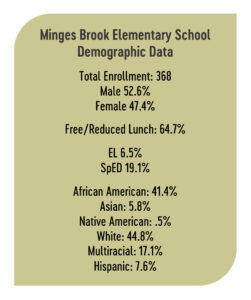 Starr’s theory of change is that when trauma-informed and resilience-focused adults work within trauma-informed and resilience-focused systems, the wellbeing and success of children will increase. This theory is the foundation of the Resilient Schools Project that includes not only professional training, but also practical tools, coaching, and evaluation measures to implement and sustain trauma-informed, resilience-focused care in education settings.
Starr’s theory of change is that when trauma-informed and resilience-focused adults work within trauma-informed and resilience-focused systems, the wellbeing and success of children will increase. This theory is the foundation of the Resilient Schools Project that includes not only professional training, but also practical tools, coaching, and evaluation measures to implement and sustain trauma-informed, resilience-focused care in education settings.
Through a grant, Lakeview School District partnered with Starr, with support from local community partners to begin planning and mapping changes to transform the district. La Nae Peek, Lakeview’s district-level Director of Resilience has been a champion of this work for Lakeview Schools since the beginning of the project, having previously learned about Starr through her network of colleagues across districts. She recalled being at the table with community partners that wanted to support the vision to “dream big”. She wondered, “How do we teach our teachers what [a trauma-informed resilient school] looks like and how do we support our students better in the classroom?” She became instrumental in working with Starr to create a plan for bringing about intervention to the district.
This could not have been possible without district leadership support. Peek explained the importance of district leadership buy-in where “the district office has to believe in the work” and make it a financial priority. The plan began with utilizing grant funding to provide staff across the district an introduction to trauma-informed, resilience-focused care as well as create emotional regulation stations with sensory tools in each classroom. Also known as calming corners, these stations empower students to have a place within the classroom where they can choose to “reset” or regulate their emotions.
Next, Starr delivered district-wide training on Lakeview’s professional development days, which included extensive training on Starr’s 10 Steps to Create a Trauma-Informed Resilient School:
 The training is designed for staff to learn how to view students through a trauma-informed, resilience-focused lens, which means being curious about how students’ unmet needs might be driving their behavior and to recognize that all students have strengths and potential. All staff – bus drivers, teachers, administrators, and support staff – are trained in a variety of ways to implement trauma-informed, resilience-focused care practices across their building. Staff learn how to develop an awareness of trauma, understand how trauma affects the brain and body, and gain the requisite skills to respond to trauma in strength-based ways.
The training is designed for staff to learn how to view students through a trauma-informed, resilience-focused lens, which means being curious about how students’ unmet needs might be driving their behavior and to recognize that all students have strengths and potential. All staff – bus drivers, teachers, administrators, and support staff – are trained in a variety of ways to implement trauma-informed, resilience-focused care practices across their building. Staff learn how to develop an awareness of trauma, understand how trauma affects the brain and body, and gain the requisite skills to respond to trauma in strength-based ways.
A key aspect of Starr’s training is to teach staff strategies that build authentic relationships with students in order to support students’ universal needs of belonging, mastery, independence, and generosity. These universal needs are part of the Circle of Courage, a model of positive youth development that serves as the basis for Starr’s approach. Strategies include greeting students, checking in with students throughout the school day, conducting classroom circles, using supportive language and positive acknowledgement consistently, as well as scheduling time to eat lunch with students. Fostering these connections sets the foundation for establishing a safe learning environment that promotes resilience.
Starr training also equips staff with ways to support students’ social and emotional skill development. Staff members learn to create sensory spaces supplied with sensory tools and offer activities that facilitate students’ adaptation to the learning environment. Staff also receive training in mind-body practices that promote play, integrate movement, include breaks, and utilize body maps that teach students emotional awareness and regulation skills, which help prepare them for effective learning. Additionally, staff are trained in classroom intervention strategies that prioritize “time-in”, rather than “time-out” of the classroom.
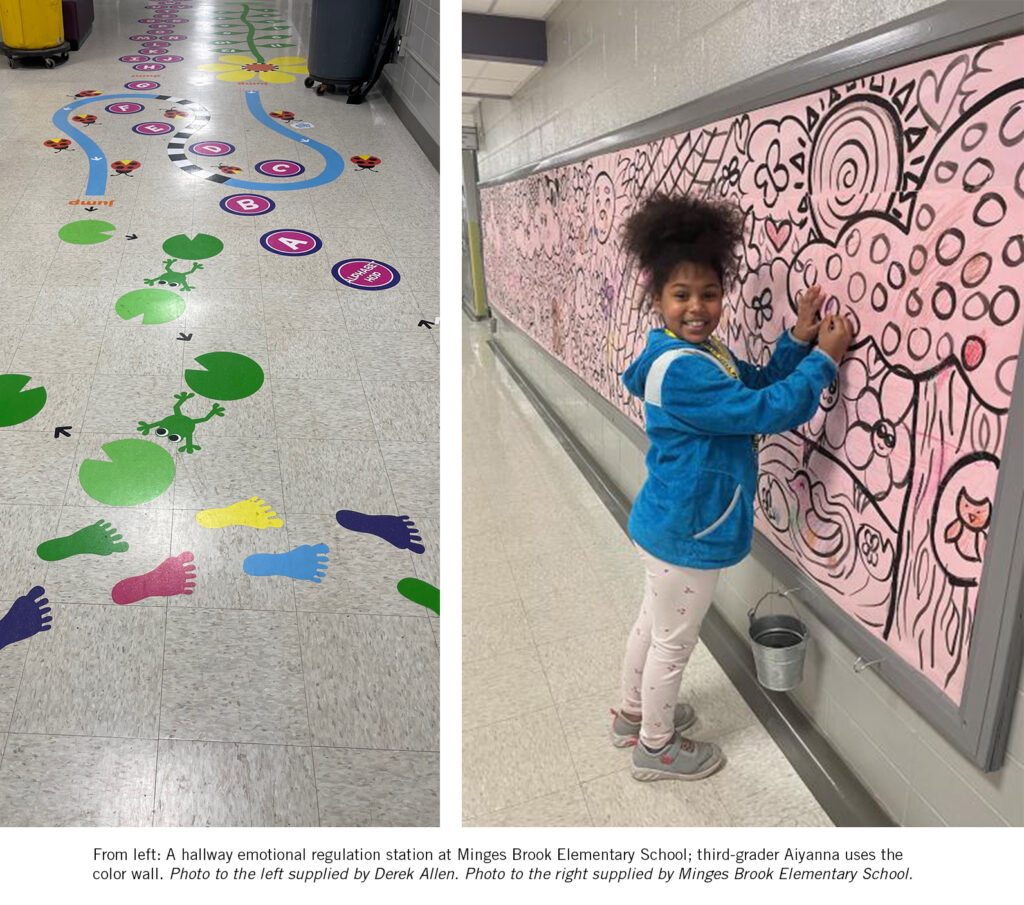 Starr also provides opportunities for staff to build upon the foundational knowledge they have gained by offering certifications in trauma and resilience. Through the certification process, staff receive comprehensive and continued training and support to help them thrive in their roles, so they can become change-makers in their building.
Starr also provides opportunities for staff to build upon the foundational knowledge they have gained by offering certifications in trauma and resilience. Through the certification process, staff receive comprehensive and continued training and support to help them thrive in their roles, so they can become change-makers in their building.
Lakeview followed up staff training by aligning its curriculum with trauma-informed, resilience-focused practices as well as mapping its K-8 curriculum with social and emotional learning activities. Prior to Heather Fausey-Riley’s role as Principal in 2019, there had been five principals each year for five years at Minges Brook Elementary. When Principal Fausey-Riley arrived at the school, there was a high number of calls for behavior supports and student engagement issues. Teacher attendance and morale were at a low point and there were various crises to attend to every day. The building struggled with staff turnover and teachers were unsure of what to do to handle behaviors. Fausey-Riley described being uncertain about trauma-informed, resilience focused care at first and whether it would be the key to turning the building around, but she decided to give it a try with her staff, as they knew they had an urgent need to put changes in place.
The staff collaborated to blend trauma-informed, resilience-focused practices with its positive behavior intervention and support (PBIS) process and protocols as well as scheduled Starr to train Minges Brook staff. Starr also helped Minges Brook establish a Champions of Resilience (COR) Team consisting of staff across the school: first-grade teacher MiKayla McCaughna, fourth-grade teachers Tracey Harper and Jessica Dotson, Early Learning Room (K-4 special education) teacher Jessica Tuttle, and Resilience Coach Renee Giddings, with the goal of this team to champion and reinforce what all staff learned from the training.
Minges Brook had created the Resilience Coach position for the building in 2018 when Renee Giddings transitioned to the role. She is a former classroom teacher, experienced with teaching multiple grades including alternative education, and is a natural fit. She offers ongoing coaching and support in trauma-informed, resilience-focused care for teachers, administrators, staff, and students. Fausey-Riley emphasized the importance of having a dedicated staff person on site. “A district would have to commit to staffing this role in each building. There is no magic equation to make this work. All of the right things just fell into place for us.”
Giddings shared that Starr’s Courageous Classrooms: Skill of the Week training in social, emotional, and behavioral intervention strategies helped Minges Brook develop the language and tools that are now consistently utilized by all Minges Brook staff. The curriculum provides students with new ways to cope with stress and build resilience so they are more available for academic learning, peer interactions, and overall school success. This, along with Minges Brook’s development of a tight support system among staff has allowed efforts to continually grow. Fausey-Riley noted, “As we became more trauma-informed, and resilience-focused, we saw a gradual increase in mindset…you struggle through until you start to see the gains….it naturally evolved – we started it, we started to see things get better, and people started to believe in it and join the effort.”
Since trauma-informed, resilience-focused care is not a prescribed program, but rather a shift in mindset, it requires a reframing of attitudes, beliefs, and behaviors that takes time and development. Fausey-Riley described her own journey with adopting the mindset, having to reframe her initial understanding of, and response to student behavior. This shift is not tangible and is unlike traditional, more punitive approaches to addressing student behavior in school. Fausey-Riley explained, “It’s more of a decision to commit to reacting and responding to behavior in a way that seeks to build students’ confidence through natural, logical, and restorative actions” rather than typical measures. It requires being curious about unmet needs that might be driving behavior and being creative with solutions that build students up.
Kristin Markillie, an Instructional Coach who has been at Minges Brook since 2007 was initially hesitant but she has fully embraced a trauma-informed, resilience-focused mindset. “When we were told that they’re putting in calming corners and that we could no longer use clip charts for behavior tracking, I was concerned at first. Now on the other end, I see how it’s working well! We knew we needed help and a new approach. Everyone is using the same [trauma-informed, resilience-focused] language consistently”, which has transformed the building for the better. Carrie Vaughn, Resilience Parapro at Minges Brook, described her own experience of coming around to the mindset shift. “I was one of the people that thought it was the kids prior to my understanding of trauma-informed care. These littles are dealing with a lot. I saw the transformation in the building. We work as a team with staff helping one another. Behavior is communication. Just because a kid is having a bad day, it doesn’t mean they’re a bad kid. It could be due to an unmet need or an underdeveloped skill.”
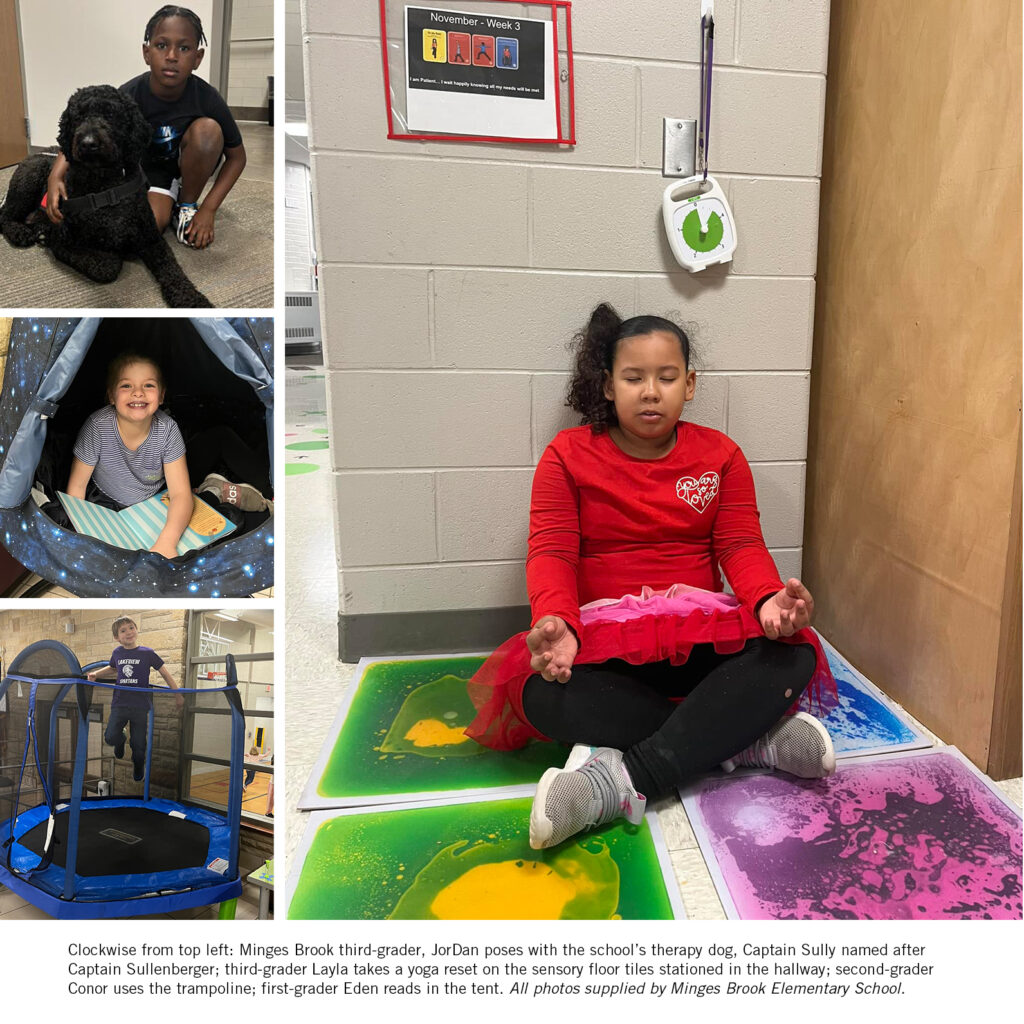 Leadership enrollment is key to the change process as leaders pave the path for building transformation to occur. Fausey-Riley committed to the process of learning alongside her staff and encountered the same learning curve as her team. Peek noted, “When people saw Principal Fausey-Riley also grapple with the mindset, it showed staff that it’s okay to struggle with something new…it’s a process, it’s a journey.” This trauma-informed, resilience-focused journey allowed Minges Brook to innovate. Its core principle is “students first” and its belief is: “every student, every day, whatever it takes.”
Leadership enrollment is key to the change process as leaders pave the path for building transformation to occur. Fausey-Riley committed to the process of learning alongside her staff and encountered the same learning curve as her team. Peek noted, “When people saw Principal Fausey-Riley also grapple with the mindset, it showed staff that it’s okay to struggle with something new…it’s a process, it’s a journey.” This trauma-informed, resilience-focused journey allowed Minges Brook to innovate. Its core principle is “students first” and its belief is: “every student, every day, whatever it takes.”
Ongoing professional training from Starr has been a foundational piece to the process and the district has continued to secure training for its staff across schools. From a district perspective, Peek reiterated the importance of district-level support. “The superintendent must support the work and stick with it. Resources to invest dollars and a plan for sustainability are key.” From a building perspective, Fausey-Riley urged that “it’s all about your staff and their commitment to children first, above and beyond academics. You have to support the work. You have to be willing to invest your own time and resources for it to be sustained. You have to take it on and make it your vision and value…It’s building that team and holding your people accountable to commit and follow through with the work.”
Will Weeks, one of Starr’s coaches and trainers, visits schools participating in the Resilient Schools Project to offer guidance on trauma-informed, resilience-focused care implementation. Some of the key elements he looks for in schools are caring adults, relationship building efforts, opportunities for play and breaks, and established practices that foster a safe environment. Weeks explained that after conducting many visits to schools across the country, he can get a sense of a school’s culture and climate the moment he walks into the building – from how the building ignites the sensory brain (sights, sounds, smells) to the various interactions of staff and students. He explained, “It’s the things you can’t touch, the intangibles… you can sense it and feel it.”
When Weeks conducted a site visit at Minges Brook, the experience left him feeling confident that students were in the best hands. “I could feel that there was a tremendous sense of belonging, comfort, and safety. It’s the supportive language the adults used with the kiddos and how the students responded to them.” He described seeing calming corners in every classroom and regulation stations in the hallways filled with sensory tools. Across grades, he observed classrooms holding community circles and class meetings. Overhead lighting was softened with fabric coverings and dimmed after lunchtime to reduce sensory input. In students’ conversations with staff, Weeks observed how students felt comfortable interacting with adults and felt safe to approach them. “As a black male walking through a school, I’m predisposed to look for how kids from diverse backgrounds are doing and whether they’re feeling a sense of belonging. At Minges Brook, I was moved to see staff love all the kids the same – brown, black, white, and the like. All of them receive love and kindness. Children just want to be loved and cared about – kindergartners up to high school – they want adults to be genuine with them, to be able to trust adults, to feel safe, which sets them up for success.”

Derek Allen, Executive Vice President & Chief Operating Officer of Starr Commonwealth reads to a class at Minges Brook Elementary School during a visit in April 2023. Photo supplied by Derek Allen.
Lakeview School District’s commitment to trauma-informed, resilience-focused care implementation has proven to be a healthy return on investment for all of its schools, with Minges Brook serving as a north star for an all-in, whole-child approach to school climate change. Since Minges Brook has embarked on its trauma-informed, resilience-focused care journey, staff have seen great gains in their school across its four years of implementation. Numerical data collected by the district shows that tier 3 behavioral incidents have decreased to nearly half the amount that Minges Brooks had prior to Resilient Schools Project intervention.
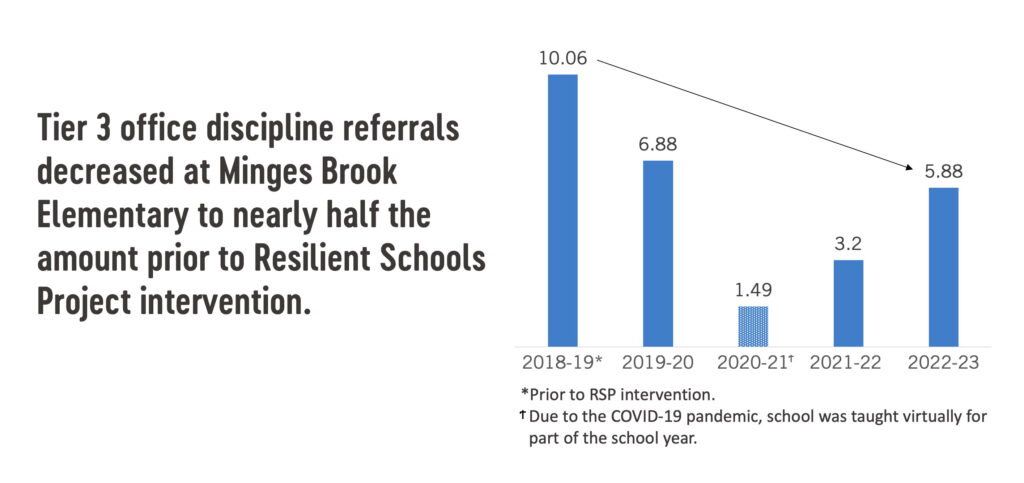 As such, out-of-school suspensions have shown a significant decrease over the years of implementation efforts from 39 in the 2018-19 school year (prior to Resilient Schools Project intervention) to 11 in the 2022-23 school year.
As such, out-of-school suspensions have shown a significant decrease over the years of implementation efforts from 39 in the 2018-19 school year (prior to Resilient Schools Project intervention) to 11 in the 2022-23 school year.
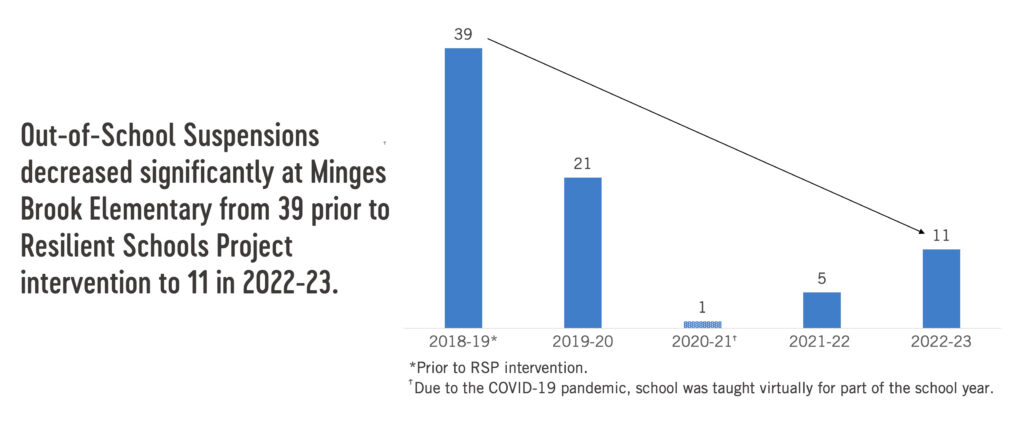 Students’ social and emotional skill development has also shown improvement on the DESSA screener against expected benchmarks. Since the 2018-19 school year (prior to Resilient Schools Project intervention), Minges Brook students have moved from 82 in the typical and strength categories (61 and 21 respectively) to 94 in the typical and strength categories (54 and 40 respectively) in 2022-23, along with a reduction in need from 18 to 6.
Students’ social and emotional skill development has also shown improvement on the DESSA screener against expected benchmarks. Since the 2018-19 school year (prior to Resilient Schools Project intervention), Minges Brook students have moved from 82 in the typical and strength categories (61 and 21 respectively) to 94 in the typical and strength categories (54 and 40 respectively) in 2022-23, along with a reduction in need from 18 to 6.
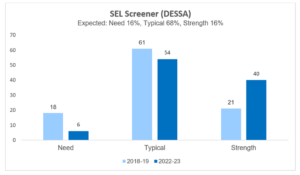 To measure staff members’ perceptions of the frequency to which they individually, and their school collectively, exhibit trauma-informed, resilience-focused knowledge and behaviors, Starr deployed a Trauma-Informed School Questionnaire (TISQ) to Minges Brook staff. The TISQ is a valid and reliable tool with 10 subscales or categories that align with Starr’s 10 Steps to Create a Trauma-Informed Resilient School model. Each subscale contains three statements measured by frequency from 1-5 (Never to Always), with each subscale average ranging from 1.00-5.00.
To measure staff members’ perceptions of the frequency to which they individually, and their school collectively, exhibit trauma-informed, resilience-focused knowledge and behaviors, Starr deployed a Trauma-Informed School Questionnaire (TISQ) to Minges Brook staff. The TISQ is a valid and reliable tool with 10 subscales or categories that align with Starr’s 10 Steps to Create a Trauma-Informed Resilient School model. Each subscale contains three statements measured by frequency from 1-5 (Never to Always), with each subscale average ranging from 1.00-5.00.
A school’s subscale averages score in either the “discovering,” “evolving,” or “flourishing” ranges. Scores in the discovering range identify areas of focus. Scores in the evolving range indicate that trauma-informed, resilience-focused knowledge and behaviors are exhibited with some frequency and that a school is making progress in trauma-informed, resilience-focused care implementation. Scores in the flourishing range demonstrate that a school is consistently exhibiting trauma-informed, resilience-focused knowledge and behaviors and should continue its exemplary efforts.
Administered to Minges Brook staff in November 2020 and in December 2021, Minges Brook’s TISQ scores show that the school is thriving on its Trauma-Informed Resilient School journey, consistently scoring in the “flourishing range” in all 10 TISQ subscales across measurement intervals along with improved scores in all 10 subscales in December 2021 compared to November 2020 scores.
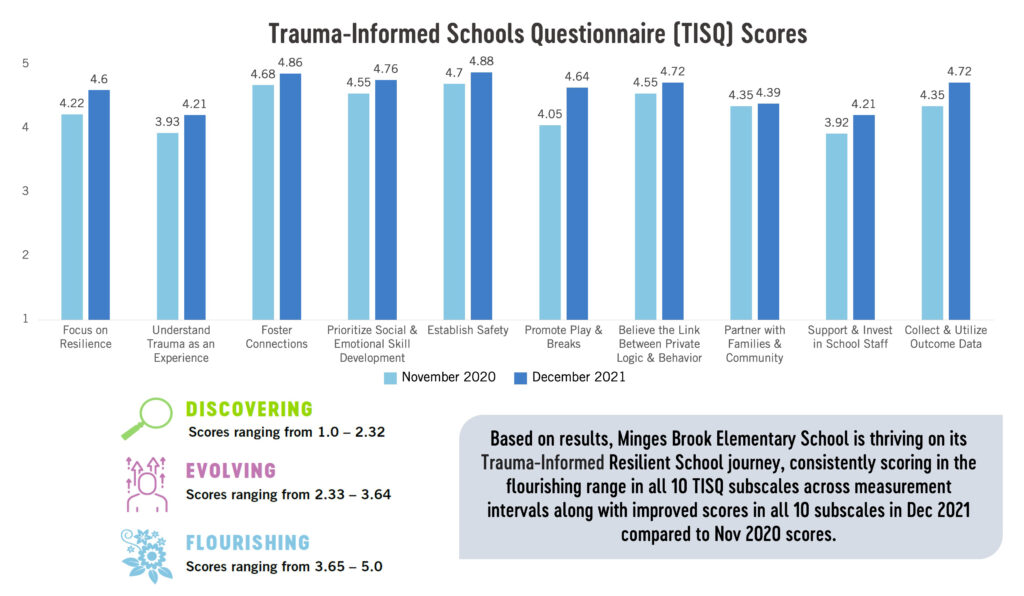 In addition to these gains, Minges Brook staff emphasized that academic engagement has increased. Student attendance has increased by about 3.5% in the last school year alone and reading and math achievement data was the highest Minges Brook has seen in four years. Moreover, Minges Brook’s percentage of students who met or exceeded their fall to spring RIT scores in math and reading on state standardized tests were the highest they’ve seen compared to previous years.
In addition to these gains, Minges Brook staff emphasized that academic engagement has increased. Student attendance has increased by about 3.5% in the last school year alone and reading and math achievement data was the highest Minges Brook has seen in four years. Moreover, Minges Brook’s percentage of students who met or exceeded their fall to spring RIT scores in math and reading on state standardized tests were the highest they’ve seen compared to previous years.
In open-ended responses on the TISQ survey, staff reported that students are much more engaged with the curriculum and becoming more creative and curious learners, demonstrated through increased participation in lessons, cooperation, flexibility, and focus. Additionally, teamwork and cooperation has increased, and students are more willing to take chances and try something difficult because they feel it is okay to make mistakes.
Tracey Harper, a fourth-grade teacher at Minges Brook supports these findings. Her students have learned to recognize what is happening in their bodies before their behaviors reach elevated levels. They are able to identify when they are not in their “thinking brain” and are encouraged to ask for “time and space” when needed. As a result, she is seeing a “huge improvement in student engagement and test scores, where students want to learn” and are setting their own learning goals. Sarah Jones, a Reading Interventionist, has worked with a set of twins for several years that were reading below grade level. A re-evaluation of the students this year shows that they are now caught up to fourth-grade reading level. Jessica Day, a Kindergarten teacher, has also found positive results with students. “My kids could run the room if I needed to step out. They know the schedule, our daily practices, and can solve disagreements on their own.” Day’s students have developed the skills to “notice, own it, restore, and move on” from their behaviors and identify where they are on a five-point scale of emotional regulation.
“Our main goal is that students want to come to school, love going to school, and feel safe” Fausey-Riley shared. Giddings added, “For kids and even adults in the building, belonging is being met here. Kids feel safe and connected and staff want to come here.” Staff satisfaction at Minges Brook has indeed improved, resulting in increased teacher and staff attendance. Harper explained that Minges Brook had been a building that teachers and substitutes did not want to come to, but this is not the case anymore. Teachers and staff are now rarely absent from Minges Brook. “Teachers feel supported by one another and by administrators. It’s all our kids. Everyone pitches in and is willing to help…engaging with the kids whether they’re in our classroom or another classroom. The kids see this too.” Jones agreed: “Honestly, [before trauma-informed, resilience-focused care implementation], I used to count down to the last day of school but today [on the last day of the school year], I’m sad that it’s the last day – it’s nice to come to work in this
atmosphere and culture.”
These results align with a pattern that Starr has been finding across schools participating in the Resilient Schools Project: improved student behavior, increased academic engagement, and improved teacher morale, which lead to overall improvement of school climate.
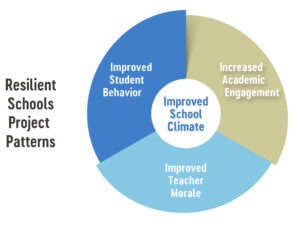
As these components begin to shift the school building, parents have also noticed the positive impact. Minges Brook hosts evening activities where families are invited to play math and literacy games with students and take tours of the school including the regulation stations in hallways and classrooms and a newly installed rock wall. The focus is on showing parents trauma-informed resilience-focused strategies and tools their children are learning in school. Parents recognize the difference Minges Brook is having on their children at home. One parent explained that she has two daughters attending the school, one in fourth grade and the other in second grade. She observed her older daughter creating a calming corner at home so that her younger sister could have a place to reset and work through emotions. She noted that teaching children that “it’s okay to not be okay” is essential. Encouraging children to identify when they need time and space to emotionally regulate is “teaching them valuable life skills.” Seeing children model for one another how to do so is icing on the cake.
A parent who had moved their child from a different elementary school to Minges Brook shared their gratitude for Minges Brook’s trauma-informed, resilience-focused approach to working with her child:
“I had never heard of ‘trauma informed practices’ until I moved my child to Minges Brook…He was labeled as having behavioral and uncontrollable anger issues [and] only allowed to attend school for half a day. Within three months of moving to Minges Brook he was flourishing and able to attend school for the whole day. He found a new love for school. He felt welcomed and safe…His journey has been a tough and stressful one. Not just for him, but [for] myself as his parent. Every single person we have encountered [at Minges Brook], has been nothing short of amazing, loving, caring and helpful…He can now refocus and redirect his energy in a more
positive way.”
In terms of cost, Lakeview secured an estimated $300,000 of initial partnership funding in its first year and has committed to allocating over $1M per year district-wide on staff, training, and resources, along with additional grant writing and fundraising for trauma-informed, resilience-focused care implementation. With four years of trauma-informed, resilience-focused care implementation under its belt, Minges Brook is mainly self-sufficient. After initial set up costs, costs continue to taper over time with only maintenance costs to sustain its trauma-informed, resilience-focused care efforts. Moreover, as Minges Brook has established itself in its ongoing commitment to creating a safe and structured learning environment with positive impacts on students, funding from local foundations has poured in. This is in large part thanks to staff who are willing to go above and beyond their roles, including Jessica Day who in addition to teaching kindergarten, writes grants to fund the school’s additional equipment such as sensory floor tiles and materials for calming corners.
Minges Brook staff are at a point now where they can plan for how these practices stay in place for students long-term. When students leave Minges Brook, staff wonder whether they will continue to utilize the strategies they’ve learned. Staff would like to monitor and collect that data to see how their former students show up in middle school. Graduates of Minges Brook Elementary School are already showing an interest in building upon their self-regulation skill sets in middle school so efforts to ensure consistency in language as well as restorative practices when addressing behaviors across schools is of great interest.
Minges Brook will also build upon its current efforts by continuing to offer Starr training for its staff, which will allow existing staff to increase their knowledge base and ensure that any new staff receive training.
While Minges Brook is moving along on its trauma-informed resilient school journey, staff remind that their school transformation does not preclude them from serving students that exhibit challenging and unexpected behavior. Yet, it’s how they react and respond to student behavior that has allowed them to offer support to create a calm school culture and climate, which has transformed their school over four years of implementation.
Kristin Markillie shared, “We are so lucky here at Minges Brook to have a whole staff that truly cares about every student that walks through our doors. One of my favorite quotes in life is ‘when we know better, we do better’ and we are truly living that every day here at Minges Brook. We will continue to learn, help support and grow together as a building through this process. We have come so far as a staff, and I feel lucky to be a part of it.” In the same vein, Jessica Day reflected on her journey as a teacher at Minges Brook: “Starr’s professional development training “made me love teaching again. Now I have the skills to make students’ lives better.”
—————————————————————————————————————————–
References:
[1]Levin, S. S., Strand, G., & Ray, M. (2021). The Resilient Schools Project: A systems approach to building trauma-informed, resilience-focused schools. Albion, MI: Starr Commonwealth.
Additional Resources:
- To learn more about Starr’s Resilient Schools Project, please read the whitepaper.
- For information on Starr’s 10 Steps to Create a Trauma-Informed Resilient School, please visit https://starr.org/store/.
- To inquire about Starr’s trauma and resilience certifications, please visit: https://starr.org/certified-trauma-and-resilience-education/.
- To evaluate your school’s trauma-informed, resilience-focused efforts, please visit: https://starr.org/product/trauma-informed-school-questionnaire-tisq-individual-school-building-assessment/
Acknowledgements:
The author wishes to thank LaNae Peek, Heather Fausey-Riley, Renee Giddings, Tracey Harper, Sarah Jones, Kristin Markillie, Jessica Day, and Carrie Vaughn for sharing their experiences on learning and implementing trauma-informed, resilience-focused care in their school and district. The author thanks Dr. Caelan Soma and Kathy Hart for their expertise on trauma-informed, resilience-focused care implementation in schools. The author thanks Will Weeks and Beau Hutchings for sharing experiences about their visits to Minges Brook. The author also wishes to thank Dr. Katey Price and Renee Miller, LMSW, for their assistance with data collection and analysis.
Stacey S. Levin, PhD, is the Senior Director of Research, Evaluation, and Innovation at Starr Commonwealth, leading a team of evaluators, analysts, and researchers to conduct research in trauma-informed care and resilience science. She is a certified K-12 teacher and has been a dedicated educator for over twenty years, having taught public school as well as instructed pre-service and in-service teachers in college and university education programs.
